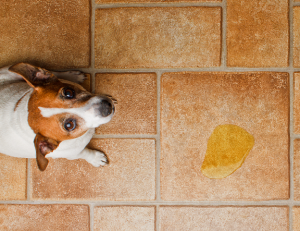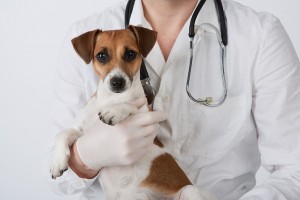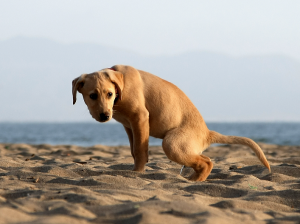By Tricia Fagan CPDT-KA
The Problem with Pee . . . and Poo!
Are you having difficulties with your pooch eliminating in the house? There can be many causes for house soiling, and training is only one possible solution. Dogs can urinate or defecate in the home because of illness, incontinence, physical limitations, normal dog communication, stress, loss of normal need for cleanliness (rare), or simply a lack of training.
 Dogs can have medical issues that impair their ability honor the house training rules. Urinary tract infections are a common cause of the breakdown of house training. Urinary tract infections cause the dog to have sudden and painful need to eliminate. Typically a dog will pee with great frequency and small amounts. Urinary tract infections can progress from a minor inconvenience to a serious illness in a few days. If you suspect your dog might have a urinary tract infection, please take him to your vet right away. There are other medical conditions that might cause house soiling, from inflammation of the bladder to stones in the bladder or kidneys. Your vet needs to see and evaluate your dog to make an accurate diagnosis. If you have a dog that was previously house trained, or a dog that urinates with great frequency, please make an appointment with your vet right away.
Dogs can have medical issues that impair their ability honor the house training rules. Urinary tract infections are a common cause of the breakdown of house training. Urinary tract infections cause the dog to have sudden and painful need to eliminate. Typically a dog will pee with great frequency and small amounts. Urinary tract infections can progress from a minor inconvenience to a serious illness in a few days. If you suspect your dog might have a urinary tract infection, please take him to your vet right away. There are other medical conditions that might cause house soiling, from inflammation of the bladder to stones in the bladder or kidneys. Your vet needs to see and evaluate your dog to make an accurate diagnosis. If you have a dog that was previously house trained, or a dog that urinates with great frequency, please make an appointment with your vet right away.
Cats can have similar medical issues. My husband’s cat urinated outside litter box twice in her life. The first time, she was accidentally locked in a closet (shame on us!). The second time, she was twenty years old. She came into the living room and peed on my husband’s computer case. We took her to the emergency vet and she recovered quickly.
Both cats and dogs can suffer from blockages of the urinary tract, this is a medical emergency.
 Medical issues can also impact a pet’s defecation pattern. Anything from worms, digestive upset to prostate problems. Anytime your pet has diarrhea you must be concerned about dehydration. Dehydration is a serious problem, especially in young puppies and kittens. Diarrhea is also one symptom of a very serious condition in puppies called parvo virus. Untreated, parvo is almost always fatal. If caught early, and treated with the human antiviral medication Tami-Flu, parvo can be cured. If your puppy has diarrhea, please see your vet immediately! All puppies have worms, even those from the best breeders. Good breeders will worm puppies every two weeks until they go to their new homes. Puppy will need additional worm treatments after you bring him home. While you can purchase worming products at the pet store, most products are specific to the type of worm, and there are quite a few types! Additionally, many store bought worming products are not safe for young pets. Your vet can diagnose the type of worm infestation, and prescribe the best treatment for your pet. Remember, all puppies have worms, and should be treated. Adult dogs should be checked for worms yearly, at a minimum.
Medical issues can also impact a pet’s defecation pattern. Anything from worms, digestive upset to prostate problems. Anytime your pet has diarrhea you must be concerned about dehydration. Dehydration is a serious problem, especially in young puppies and kittens. Diarrhea is also one symptom of a very serious condition in puppies called parvo virus. Untreated, parvo is almost always fatal. If caught early, and treated with the human antiviral medication Tami-Flu, parvo can be cured. If your puppy has diarrhea, please see your vet immediately! All puppies have worms, even those from the best breeders. Good breeders will worm puppies every two weeks until they go to their new homes. Puppy will need additional worm treatments after you bring him home. While you can purchase worming products at the pet store, most products are specific to the type of worm, and there are quite a few types! Additionally, many store bought worming products are not safe for young pets. Your vet can diagnose the type of worm infestation, and prescribe the best treatment for your pet. Remember, all puppies have worms, and should be treated. Adult dogs should be checked for worms yearly, at a minimum.
Dogs, cats and people vary in their ability to “hold it”. As a general rule, puppies can wait as many hours as they are months old, plus one. For example a four month old puppy might be able to wait five hours (four months plus one) between trips to the toilet area. This is a good guess, but your puppy may or may not be able to wait this long. If your puppy is actively playing, he may need to pee as often as every fifteen minutes. (Really!) The months-plus-one rule is only for puppies that are calm and resting.
When you get your puppy at seven or eight weeks of age (not younger!), he probably will need to eliminate in the middle of the night. You must plan to take him outside or place him in an area where it is easy for you to clean. As a warning, a young puppy alone will be quite distressed, and express this vocally. If you place your very young puppy alone at night, you might not get much sleep! I like to place puppies in a crate next to my bed. I can put a finger or two inside the crate, to reassure the puppy, and will wake up when puppy becomes restless. Often one potty trip is enough for one night. If possible, let the puppy tell you when he needs to go. If you are a heavy sleeper and cannot hear a restless whiny puppy, you might have to set your alarm.
 As your puppy grows, he will be able to sleep all night, without a trip to the doggy rest room. Just because your puppy can hold it for eight hours while he sleeps, this does not mean he can hold it for eight to ten hours while you are at work. Arrange for a safe area for your puppy while you are at work. Puppy may not be crated while you are at work until he is older. Keep your puppy in a long term confinement area that allows separate areas for sleeping, eating and playing. Pick an easy to clean area, and make sure the puppy can’t escape or get into anything potentially harmful (chemicals, drown in the toilet, etc.)
As your puppy grows, he will be able to sleep all night, without a trip to the doggy rest room. Just because your puppy can hold it for eight hours while he sleeps, this does not mean he can hold it for eight to ten hours while you are at work. Arrange for a safe area for your puppy while you are at work. Puppy may not be crated while you are at work until he is older. Keep your puppy in a long term confinement area that allows separate areas for sleeping, eating and playing. Pick an easy to clean area, and make sure the puppy can’t escape or get into anything potentially harmful (chemicals, drown in the toilet, etc.)
Some puppies, because they are very submissive, or easily excited, will urinate when they greet someone. Please remember that this is just a communication from the dog to you. If you get angry with the dog for submissive urination, he will urinate more. Talk with your dog trainer about ways to reduce submissive or excitement urination.
Sometimes dogs are incontinent. The most common symptom of this is a dog who leaks urine while asleep. This is not under the control of the dog, no amount of anger or punishment on your part will help. If your dog leaks urine while asleep, see your vet for solutions to this problem.
If your dog or puppy has experienced a recent illness or surgery, this may affect his ability to hold it. Allow your dog time to recover, and give him plenty of opportunities to relieve himself.
Age effects us all, even dogs. As your dog becomes older, he may need more opportunities to eliminate. When an older dog begins to have to have accidents in the house, a trip to the vet is in order. Your vet may be able to assist your pet with graceful aging.
If your vet gives your pet a clean bill of health, ask your dog trainer for assistance with house training. Houston Professional Dog Training.
Tricia Fagan CPDT-KA
DogS Gone Good
www.dogSgonegood.com
trainer@dogSgonegood.com
(713) 557-1949



